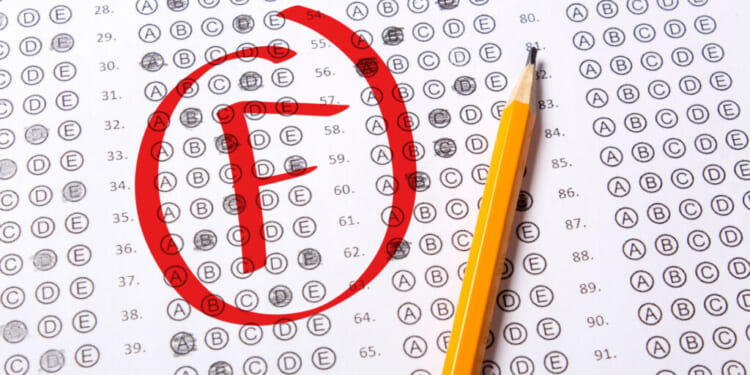State universities provide great examples of using human creativity under socialism/fascism (state-run or state-controlled systems). It is not used for productive goals. Instead, it is used by bureaucrats to achieve their own goals.
State universities are given more taxpayer money when they have more students. That creates incentives to retain students even if they show no evidence of learning. Moreover, administrators have relatives and friends whom they want to help pass classes. In “Measuring Performance in Education: Why Do Many Teachers Dislike It?” and “Is American Education a Fraud?”, I describe some ways university administrators pressure faculty to pass students regardless of their performance. When that fails, sometimes administrators simply change the grades that professors give. They use the grade challenge procedure.
A student does not need to claim to understand the material and be willing to prove that to challenge the grade. Diversity, equity, and inclusion (DEI) regulations can be used for this. While I have seen no evidence that such laws and regulations help reduce unfair discrimination, they can be used opportunistically.
Last year, I had a student who challenged his failing grade, claiming that I discriminated against online students—I had mentioned that I liked in-class exams better than online exams for measuring student performance. I think the reasons for this preference were obvious and they had nothing to do with unfair discrimination. The student did not have any problems with my statement until he failed the class.
The class had two sections, and they had very different exams, as one was online and another in person. The administrator who reviewed the challenge of the grade approved changing the grade and passing the student. Even the fact that a smaller percent of online students than in-class students failed the exam did not matter to administrators. DEI regulations did work well to give an arbitrary power to administrators.
The school had an appeal process which I followed, submitting the information online as required. I was supposed to hear from them in five business days. That did not happen. First, the excuse was that this was during summer. However, this happened more than a year ago and I still have not received a reply. At first, I hoped that administration gave up on the idea of changing the student’s grade and just did not bother to inform me. From what I learned more recently, it seems that they changed the grade and just ignored my appeal.
Administrators are creative in using technology. When the submission of an appeal is on-line instead of given to a specific person, it is easier to ignore it. No, this is not a problem with technology. Technology is not causing this or other problems in education. Administrators and teachers cause these problems because of perverse incentives, and they use technology to make it easier for them to achieve their goals.
This year, I again had a student who challenged his failing grade in my class. He wrote a long list of false claims. So far, the administration was very supportive of the complaining student’s claims—the appeal process worked the last time for them to change the grade; why not try again?
The list of complaints started with claims about a relative’s death and me not providing accommodations that the school required me to provide. As evidence, the student used my reply to his e-mail where he provided no evidence to support his claims. The inconvenient fact that the school rules required students to submit evidence in such cases instead of just making claims if they want the university approved absence was conveniently ignored. Even the evidence that I was provided later did not include a death of a close relative that university considered as an approved excuse.
This brings some bad memories for me. Claims about grandparent deaths (without providing supporting evidence) were the most common excuse that I heard some students use repeatedly as excuses for unfinished homework assignments in primary through high school education in the Union of Soviet Socialist Republics (USSR), where I grew up. It is disturbing, but not surprising, to see that our Prussian university education in the United States is becoming more like primary through high school education in the USSR—both education systems are based on the Prussian education model. Any evidence of good-quality education in the USSR relied on allowing students to cheat during exams.
(If you are not familiar with the Prussian academic system, see “The Inherent Flaws of the Prussian Education System”, “What Has Happened to Our Great Universities?”, and “Why Are American Taxpayers Forced to Subsidize and Support the Prussian Education System?” For examples of other current problems in our education system, see “Peer Review of Academic Articles: Gold Standard or Paper Money Standard?” and the articles you can access from there.)
Another disturbing claim by the student was requiring points for very good class participation. I did specify that these points were based on the quality of participation. I wondered if there was any chance that the student and administration really did not understand that a student who failed all exams given during the semester could not be very good at participating in class discussions.
The student even used his inappropriate behavior during the exam as a reason for complaining. While students were not allowed to bring any solutions of problems to the exam, the student used a calculator where past solutions were saved. When I noticed this, I told him that he cannot use that calculator. The student did not argue about this during the exam—he also had Excel to use, so he did not even need the calculator. However, later he claimed that this unfairly reduced his grade.
Coming back soon after the end of the exam, when he knew that he failed the class, the student claimed that his calculator deletes everything whenever it is closed and that he did not have any earlier calculations during the exam. By that time, he did delete everything from the calculator.
During the exam, I thought that the student might have not realized that everything was saved in his calculator—there was so much recorded in the memory that it seemed likely that the student never deleted anything from this calculator. That still would make his behavior inappropriate but not dishonest. His later claims convinced me that the student was dishonest.
These are just a few examples of dishonest claims. If universities cared about education, the student should not only fail the class, but the university also should take appropriate actions against the student for dishonest behavior and against the administrators who supported this dishonest behavior.
Moreover, the university should investigate its procedures that facilitate dishonest behavior and change them. Dishonesty should not be tolerated. However, without any interference from outside, I expect the same result with this student as with the last-year-complaining student. Our Prussian university system rewards rather than punishes bad behavior by administrators.
Unfortunately, such behavior by administrators encourages some professors not to even bother giving failing grades to students, or giving them seldomly. Why waste your time dealing with the appeal processes if the result is the same in the end? However, I doubt if this is the right attitude. Administrators could not misbehave like this without support from a significant number of professors.
Morally, it is hard to justify such professor behavior, unless they hope that their encouragement of further misbehavior by administrators will provide the necessary evidence to abolish the failing Prussian education system. The last is an admirable goal, but if that is the goal, professors should do more than just collaborate with misbehaving administrators.

















